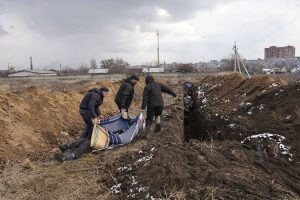Zoé Tkaczyk
Impunity Watch News Guest Writer
THE HAGUE, Netherlands – On 2 February 2024, the International Court of Justice (ICJ) issued a landmark decision for Ukraine’s case against Russia regarding genocide allegations. The ICJ rendered its decision on the preliminary objections concerning Allegations of Genocide under the Convention on the Prevention and Punishment of the Crime of Genocide (CPPCG). 32 States intervened.
Ukraine employed an exceptional legal maneuver. Because there is no international court with jurisdiction over UN Charter violations or the crime of aggression, Ukraine used the dispute resolution provision in the CPPCG to bring Russia to court. To justify its invasion, Russia claimed Ukraine was committing genocide against the Russian ethnic minority in eastern Ukraine. Ukraine used Russia’s disinformation against it. Ukraine argued that this established a dispute under the CPPCG and called for Court resolution. While the Court ordered Russia to suspend its military operations in the region to begin its provisional measures and investigations, Russia unsurprisingly ignored the order.
While these provisional measures seemed a big win for Ukraine in the early stages of the war, the mixed decision in February of this year has left many claiming the Court failed to deliver. The ICJ unanimously dismissed Russia’s procedural objections in its judgment, ruling that the Court can decide on the merits if Ukraine violated the CPPCG in the Donetsk and Luhansk Regions. Many human rights advocacy organizations highlighted how important the admissibility of reverse compliance claims is as Russia continues to spread anti-Ukrainian propaganda and hate speech. The unanimous dismissal of Russia’s procedural objections in the genocide case was a victory for Ukraine’s legal battles. Still, many regret that the ICJ did not determine Russia’s false allegations of genocide to justify the full-scale invasion of Ukraine to fall within the scope of the CPPCG. By sustaining Russia’s objection regarding subject-matter jurisdiction by a 12 to 4 vote, the Court raised significant concerns about applying the CPPCG in broad contexts.
Ukraine’s pyrrhic victory means that its conduct, not Russia’s has been the subject of the hearing. However, the Court has still been able to review Russia’s key justification for its military campaign. Anton Korynevych, Ukraine’s legal team leader told reporters, “It is important that the court will decide on the issue that Ukraine is not responsible for some mythical genocide, which the Russian Federation falsely alleged that Ukraine has committed.”
Additionally, Russia’s violations of the Court’s provisional measures order might also give Ukraine some more room to maneuver. However, they must contend with a Court likely unwilling to rule on an issue in the borders of its jurisdictional boundaries, especially when its ruling will likely be ignored. A redundant declaration of illegality, while satisfying, may do little more than keep waning support mobilized. The nations condemning Russia’s acts would likely condemn regardless of the Court’s rulings, and Moscow has had no reservations ignoring the holdings.
This may pose additional challenges to the international community when addressing serious human rights violations. The Court is in the middle of a highly charged political, legal, and military confrontation with no police or military to back its decisions. The only formal mechanism for Court decision enforcement is referral to the Security Council. But when the state subject to the decision retains a permanent seat on the Council, the chance of an enforcement resolution is slim. The Court must be careful to preserve its legitimacy in light of its predicament. While there were no obviously negative consequences of the mixed decision, it has pushed Ukraine to focus even more intensely on evidence collection of human rights violations and crimes committed by Russian forces to increase the chances of future legal victories.
This article is one of a seven-part series exploring the Russo-Ukrainian War. Zoé Tkaczyk is a J.D./MAIR candidate (May 2025) at the Syracuse University College of Law and Maxwell School of Citizenship and Public Affairs. This article series was inspired by sessions from the Carnegie-Maxwell Policy Planning Lab Fellowship: Postwar: Europe, Ukraine and the Future of European Order. Special thanks to Cora True-Frost and Alexa Connaughton for their guidance, feedback, and edits.
